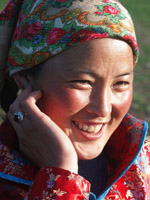Daur
Jump to navigation
Jump to search
English[edit]


Alternative forms[edit]
Etymology[edit]
Official Chinese GB 3304‐91 romanisation. Borrowed from Daur daur and Russian дау́ръ m anim sg (daúr, noun), alternative forms reflect Manchu ᡩᠠᡤᡡᡵ (dagūr), ᡩᠠᡥᡡᡵ (dahūr), and Classical Mongolian ᠳᠠᠭᠤᠷ (daɣur). The ethnonym has been considered to be originated from Khitan ⿰𘲆𘮒 (dau.úr /*dawur/, “middle, central”), a modifier used in the full name of the Liao empire.[1]
Pronunciation[edit]
daʊ'əɹ
Noun[edit]
Daur (plural Daurs or Daur)
- A member of an ethnic group (so-called ’nationality’) living in China’s Heilongjiang, Hulunbuir, and northern Xinjiang (Dzungaria), also historically Russia
- The language of the ethnic group, which belongs to the Mongolic language family.
Translations[edit]
person, people
language
References[edit]
Further reading[edit]
- Ethnologue entry for Daur, dta

